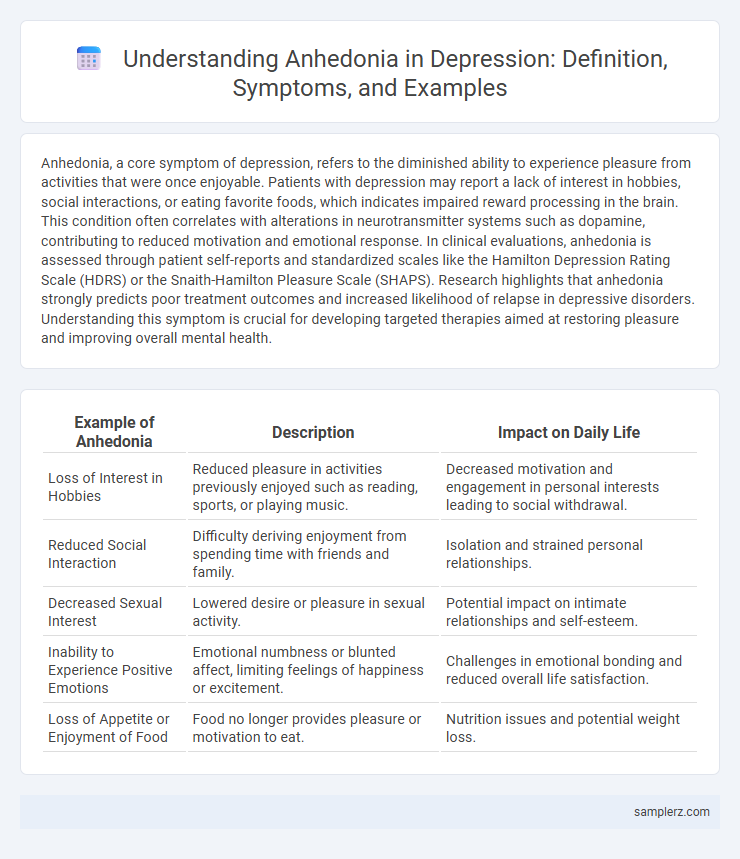Anhedonia, a core symptom of depression, refers to the diminished ability to experience pleasure from activities that were once enjoyable. Patients with depression may report a lack of interest in hobbies, social interactions, or eating favorite foods, which indicates impaired reward processing in the brain. This condition often correlates with alterations in neurotransmitter systems such as dopamine, contributing to reduced motivation and emotional response. In clinical evaluations, anhedonia is assessed through patient self-reports and standardized scales like the Hamilton Depression Rating Scale (HDRS) or the Snaith-Hamilton Pleasure Scale (SHAPS). Research highlights that anhedonia strongly predicts poor treatment outcomes and increased likelihood of relapse in depressive disorders. Understanding this symptom is crucial for developing targeted therapies aimed at restoring pleasure and improving overall mental health.
Table of Comparison
| Example of Anhedonia | Description | Impact on Daily Life |
|---|---|---|
| Loss of Interest in Hobbies | Reduced pleasure in activities previously enjoyed such as reading, sports, or playing music. | Decreased motivation and engagement in personal interests leading to social withdrawal. |
| Reduced Social Interaction | Difficulty deriving enjoyment from spending time with friends and family. | Isolation and strained personal relationships. |
| Decreased Sexual Interest | Lowered desire or pleasure in sexual activity. | Potential impact on intimate relationships and self-esteem. |
| Inability to Experience Positive Emotions | Emotional numbness or blunted affect, limiting feelings of happiness or excitement. | Challenges in emotional bonding and reduced overall life satisfaction. |
| Loss of Appetite or Enjoyment of Food | Food no longer provides pleasure or motivation to eat. | Nutrition issues and potential weight loss. |
Understanding Anhedonia: A Core Symptom of Depression
Anhedonia, a core symptom of depression, manifests as a diminished ability to experience pleasure from activities once found enjoyable, such as hobbies, social interactions, or eating favorite foods. This symptom significantly impacts motivation and engagement, often leading to social withdrawal and decreased participation in daily life. Understanding anhedonia helps clinicians develop targeted treatment strategies to improve emotional responsiveness and enhance overall mental well-being.
Social Withdrawal: Losing Interest in Relationships
Anhedonia in depression often manifests as social withdrawal, where individuals lose interest in previously meaningful relationships and social interactions. This diminished capacity to experience pleasure results in isolation and reduced social engagement, exacerbating feelings of loneliness and emotional distress. Research shows that social withdrawal significantly impacts recovery outcomes, highlighting the need for targeted interventions in depressive disorders.
Diminished Pleasure in Hobbies and Activities
Anhedonia in depression often manifests as a marked decrease in the ability to experience pleasure from hobbies and activities that were once enjoyable, such as painting, playing sports, or socializing with friends. This diminished pleasure leads to reduced participation and withdrawal, exacerbating feelings of isolation and low mood. Neurobiological studies link this symptom to impaired reward processing within the brain's mesolimbic dopamine pathway.
Decreased Motivation for Daily Tasks
Anhedonia in depression often manifests as a decreased motivation for daily tasks such as personal hygiene, cooking, or completing work assignments. Patients may experience a significant lack of interest or pleasure, leading to neglect of routine activities essential for maintaining physical and mental health. This symptom is a core diagnostic feature of major depressive disorder, impairing functional capacity and overall quality of life.
Emotional Flatness: Reduced Response to Positive Events
Anhedonia in depression often manifests as emotional flatness, where individuals exhibit a markedly reduced response to positive events such as receiving praise or engaging in enjoyable activities. This diminished emotional reactivity impairs the brain's reward system, particularly affecting dopamine pathways in the prefrontal cortex and nucleus accumbens. The resulting lack of pleasure or interest can significantly worsen depressive symptoms and hinder recovery efforts.
Blunted Reward Response to Achievements
Anhedonia in depression often manifests as a blunted reward response to achievements, where individuals experience diminished pleasure or satisfaction even after accomplishing significant goals. Neuroimaging studies reveal reduced activation in the brain's reward circuitry, particularly the ventral striatum and prefrontal cortex, which impairs the processing of positive feedback. This dysfunction contributes to persistent low motivation and decreased engagement in activities that were once perceived as rewarding.
Altered Eating Habits: Food Losing Its Appeal
Anhedonia in depression often manifests as altered eating habits, where individuals experience a significant loss of pleasure in food, causing meals to become unappealing and tasteless. This diminished interest can lead to reduced appetite and weight loss, impacting nutritional status and overall health. Changes in brain reward pathways related to dopamine dysfunction contribute to this phenomenon, making eating feel less satisfying and enjoyable.
Sexual Anhedonia: Loss of Interest in Intimacy
Sexual anhedonia in depression manifests as a marked loss of interest in intimacy, where individuals experience diminished pleasure from sexual activities despite physiological arousal. This symptom significantly impacts relationships and overall quality of life, often leading to frustration and increased emotional distress. Recognizing sexual anhedonia as a core feature of depressive disorders is crucial for targeted therapeutic interventions and improving patient outcomes.
Anhedonia in Physical Activity: Exercise No Longer Enjoyable
Anhedonia in depression often manifests as a loss of pleasure in physical activities, where exercise that once brought joy now feels burdensome and unfulfilling. This diminished interest in physical activity contributes to decreased motivation, worsening depressive symptoms and physical health. Understanding this specific aspect of anhedonia is crucial for developing targeted therapeutic interventions to reengage patients in beneficial exercise routines.
Impact on Work and Academic Performance
Anhedonia in depression severely diminishes motivation and the ability to experience pleasure, leading to decreased productivity and concentration at work or school. Individuals often struggle with completing tasks, meeting deadlines, and maintaining consistent attendance due to persistent lack of interest. This decline in performance can result in lower academic achievement, job loss, or the need for extended medical leave.

example of anhedonia in depression Infographic
 samplerz.com
samplerz.com